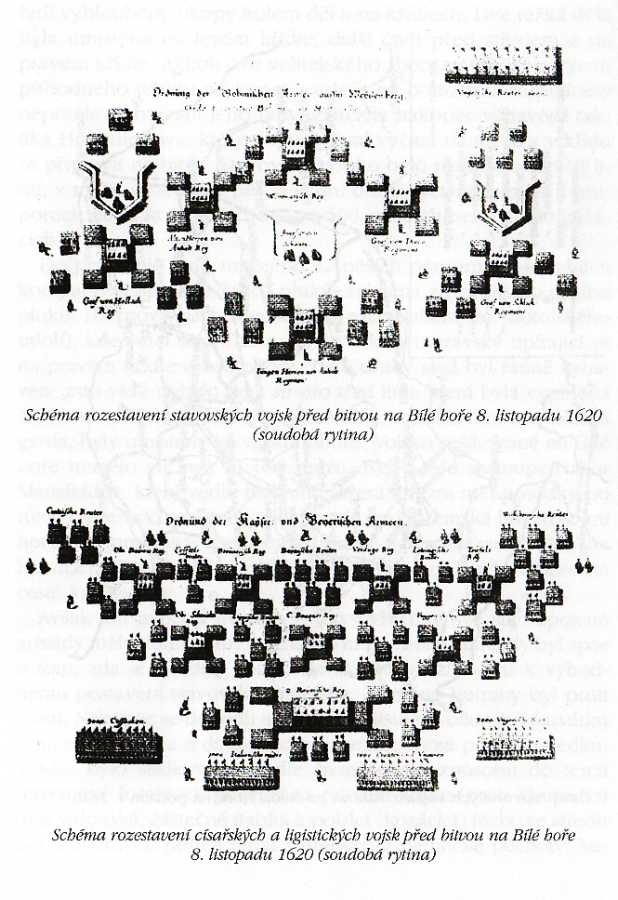The Thirty Years' War Part 4.
Categories: Years of war and revolution , Třicetiletá válka
The Battle of White Mountain Episode 4.
The result of the negotiations between Buquoy and Mansfeld
Mansfeld proposed that he would hand over Pilsen to the Emperor for 400,000 gold pieces and withdraw from Czech service.Buquoy and Maximilian thought the sum was too high, so they decided whether to pay it at all. In the end, however, they paid Mansfeld 100,000 guilders, another 100,000 on the note owed by Maximilian, and the rest was guaranteed by the Emperor himself. Mansfeld undertook to keep the truce until the whole matter was settled, and this was enough for the two commanders. The whole negotiation was to have been completely secret, but it was not. Mansfeld was called upon to explain his meddling. He pretended that the only reason for these negotiations was to buy time before winter came and stopped all operations, but almost no one believed his explanation. So the offended Mansfeld asked to be released from the king's service, but only after his financial claims were over, because the arrangement between Mansfeld and Buquoy was still in force. It's telling that the Ligist-imperial troops went to Prague, even though they knew they had Pilsen with a strong garrison in the rear and without Mansfeld doing anything despite Anhalt's express orders.

The enemy troops (the first Imperial Leaguers behind them) set out on 23 October via Křimice a Toshukov to Královice (25 October) and 27 October to Senomat near Rakovník. Here they were confronted by the Stavov army, which retreated along the shorter side of the arc to Rokycany via Mýto a Zdice at Unhošt' (25 October) and from there via Nové Strašecí went out to meet the enemy to Rakovníkwhere it arrived on 27 October. The army took up an advantageous position on a hill west of the town, where it dug in.
There was no clash in the end, although the armies lay facing each other until 4 November. There were only slight skirmishes, which inflicted only minor casualties on the enemy. As winter was approaching, it was thought that these battles would end the campaign of 1620 and the troops would retire for the winter. The situation on the Bohemian side was very desperate. Faith in victory was diminishing. The nobility of the Žatec region fled en masse to Prague, even though the Žatec was fortified and heavily garrisoned. Some of the subjects saw the flight of their superiors, and so they rose up with arms in their hands to defend themselves, and sent their representatives to Louny, Most., Kadana, a Chomutov with a call for everyone to stand together against the expected violence of the troops, at that moment it did not matter which ones. The spirit of capitulation had completely prevailed in the town, and the townspeople considered it more secure to have the imperial garrison at their backs than hordes of armed peasants. The example was set by Louny, which surrendered without a fight on November 4. to Albrecht of Wallenstein However, the war campaign was not over, which was a great surprise. On 5 November, Maximilian of Bavaria and his army bypassed the Czech army position at Rakovník and headed for Lužná and the next day reached Nové Strašecí. Behind him, she advanced through Lišov and the Imperial Army, whose commander was wounded by a shot in a delicate place and had to be transported on a wagon.
"Everyone is said to be punished there," he said jokingly, "by what he sins the most.' The Estates generals, however, were not much given to jesting, for the movement of the enemy's troops meant that the Imperialists wished to force a decision at the earliest possible moment.
The army was in such a desolate state that the worst was to be expected. Thurn took his regiment of foot on a hasty march through the forests of Křivoklát to the Prague and on November 6th the whole army retreated to Unhošt' pursued by the Ligist troops marching through Lány. Frederick had to go to Prague to take over the supervision of the fortification work and to provide sufficient ammunition, larders and tools. On the following day, 7 November, Anhalt's army, seeing that the enemy was advancing slowly, set out at noon from Unhošt' on a continuous march through the valley of the Litovický brook and at midnight took up positions on a strategically very advantageous high ground White Mountain , covered on the left flank by a cliff of the Motol valley, flanked on the right side by a game preserve of the Hvězda summer palace. The trenches could not be started until the next day and because there was a shortage of tools, the construction was lengthy.
The officers mostly went to the Prague...where the King was to meet the English legation, in whose honour a luncheon was being prepared. When, on the morning of the 8th of November, he appeared at Hostivice the vanguard of the enemy, the Estates troops, tired from their night march and without proper equipment, looked on in idleness.
Continued next time.......................................
The article is included in categories: